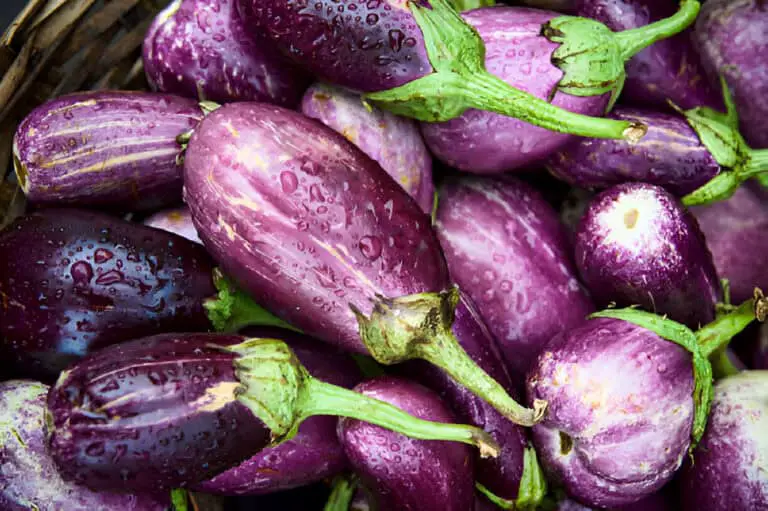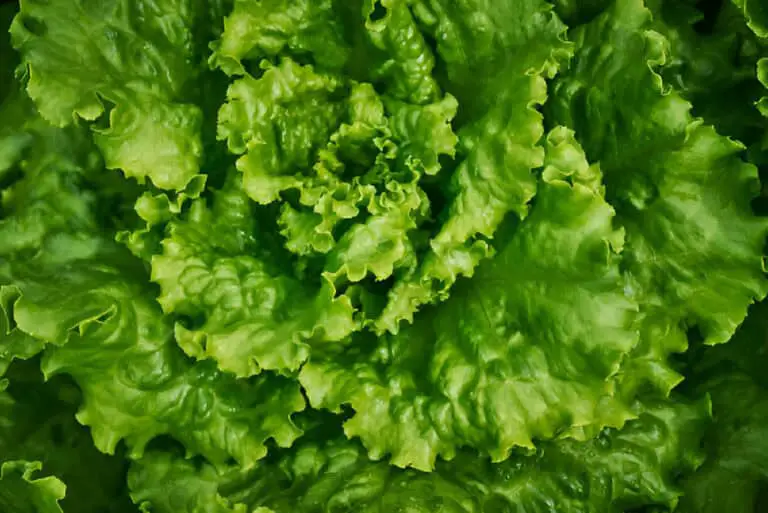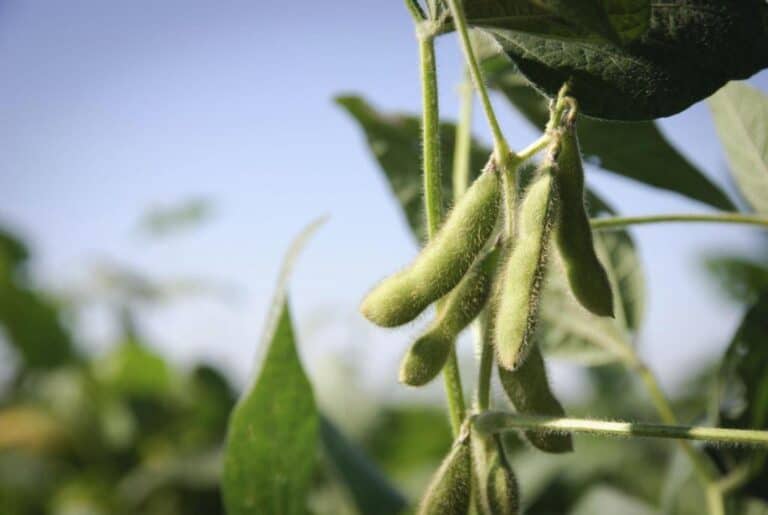Does Acorn Squash Taste Like Pumpkin? What Does It Taste Like?
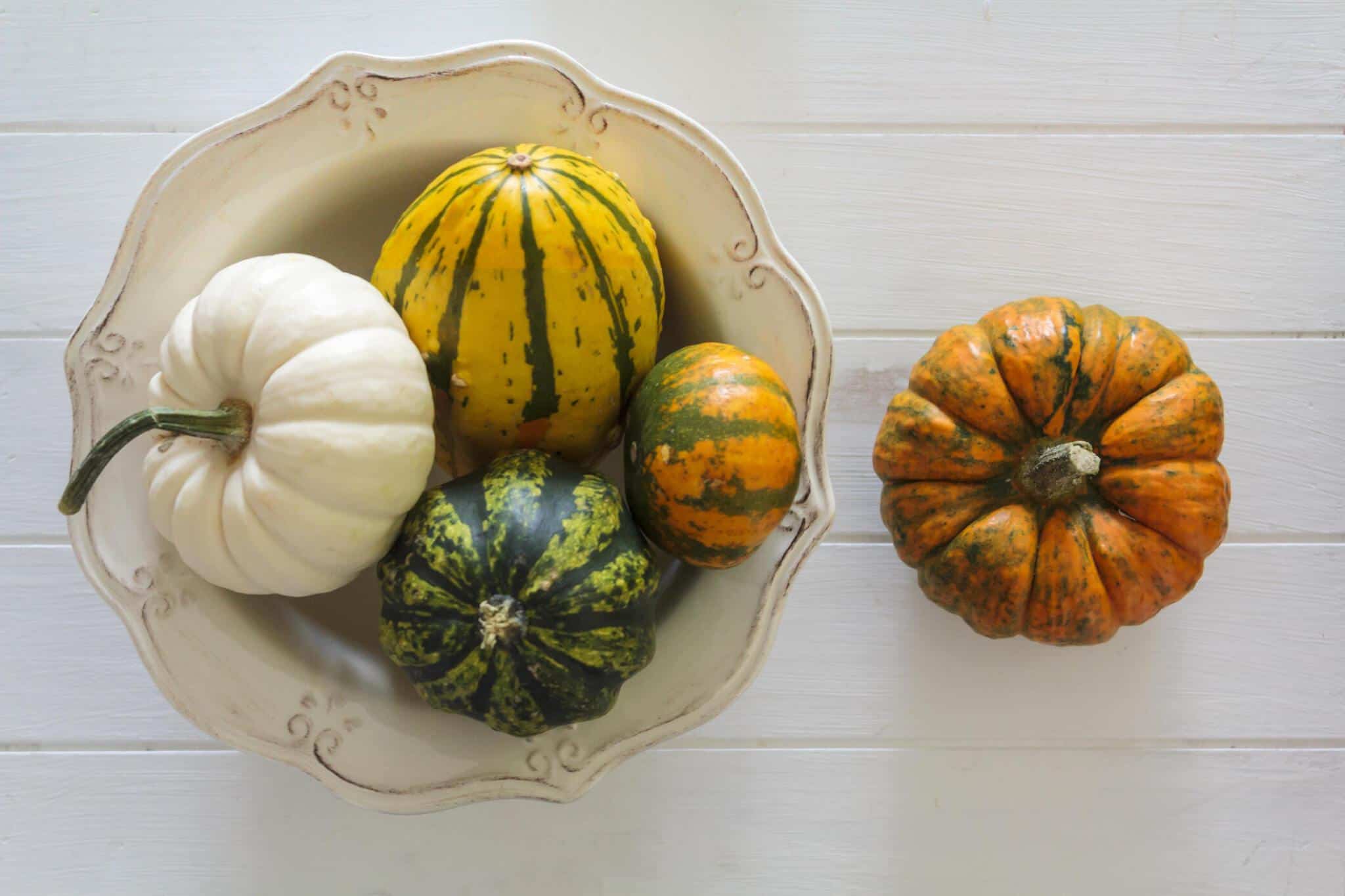
It is officially fall, and with it comes a mix of tastes that make you feel good. People who love fall often have a food mystery on their minds: Does acorn squash taste like pumpkin? Or, does it have the same enticing flavor?
Acorn squash has a milder, nuttier taste compared to the sweeter, earthier flavor of pumpkins. If you were to taste them side by side, you’d likely notice the difference.
We’ll explore the botanical ties that bind it to pumpkins, dissect their differences in appearance and flavor, and ultimately answer the age-old question: Does acorn squash truly taste like pumpkin? So, grab your apron and join us on this flavorful adventure through the enchanting world of autumn’s bounty.
Get ready for a taste adventure that will leave you savoring the essence of autumn in every bite.
Understanding Acorn Squash
Acorn squash, with its unique appearance and rich flavor, often sparks questions about its relation to pumpkins. Is it a type of pumpkin, or does it share the same taste profile?
Definition and Characteristics of Acorn Squash
Acorn squash, scientifically known as Cucurbita pepo var. turbinata, is a winter squash characterized by its distinctive shape, resembling an oversized acorn. This squash variety features a dark green, ridged skin with deep orange flesh, making it easily distinguishable.
Botanical Classification and Origin
Acorn squash belongs to the Cucurbitaceae family, the same family as pumpkins and other squash varieties. Its origins trace back to North and Central America, where indigenous peoples cultivated it for thousands of years.
Varieties of Acorn Squash
Several different types of acorn squash exist, each with subtle variations in appearance and flavor. Some popular varieties include the classic dark green acorn squash, the golden acorn squash, and the desirable sweet dumpling squash.
Nutritional Profile and Health Benefits of Acorn Squash
Acorn squash is a low-calorie vegetable, making it a healthy addition to your diet. A one-cup serving of cooked acorn squash contains approximately 115 calories and is rich in dietary fiber, making it a filling option for weight-conscious individuals.
This humble squash is a nutritional powerhouse. It provides essential vitamins like vitamin C, vitamin A, and vitamin B6. Additionally, acorn squash is a good source of minerals such as potassium, magnesium, and folate, which contribute to overall well-being.
Adding acorn squash to your diet can be good for you in many ways. Its high antioxidant content may help combat inflammation and reduce the risk of chronic diseases. The vitamins and minerals found in acorn squash support a healthy immune system and aid in digestion.
Culinary Uses of Acorn Squash
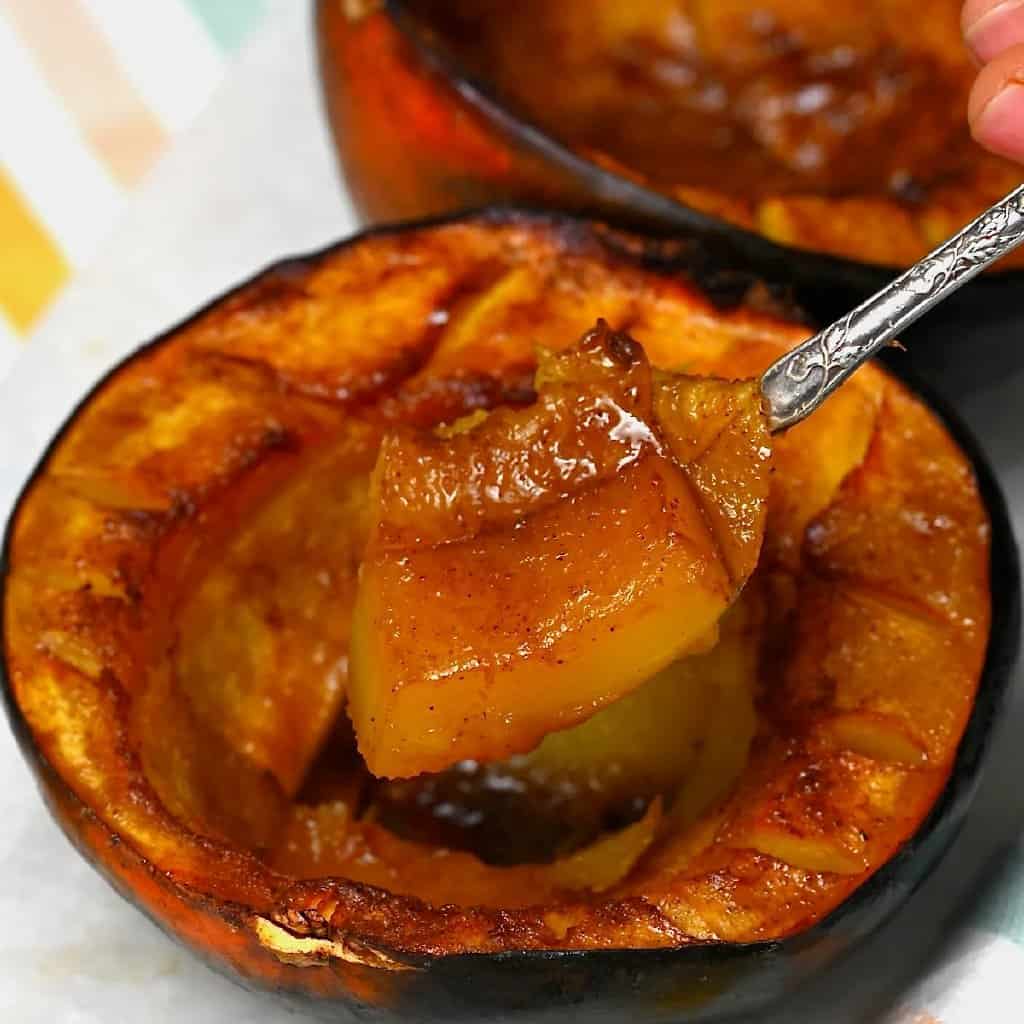
Cooking Methods: Roasting, Baking, Steaming, etc.
Acorn squash’s versatility in the kitchen makes it a favorite among cooks. You can prepare it by roasting, baking, steaming, or even microwaving. Roasting or baking acorn squash brings out its natural sweetness and enhances its flavor.
Recipes and Dishes Featuring Acorn Squash
From hearty soups to savory side dishes, acorn squash stars in a variety of recipes. A popular choice is to stuff it with a flavorful mixture of grains, vegetables, and herbs. You can also puree it to make creamy soups or use it as a colorful addition to salads.
Flavor and Texture When Cooked
When cooked, acorn squash exhibits a creamy texture with a slightly sweet and nutty flavor. Its taste profile can be described as a cross between butternut squash and sweet potato, making it a versatile ingredient in both sweet and savory dishes.
Does Acorn Squash Taste Like Pumpkin?
Acorn squash and pumpkin, two fall favorites, share a kinship in flavor, but they’re not identical twins in taste variety. Picture acorn squash as the subtler sibling, boasting a mild sweetness and nuttiness that sets it apart.
It falls somewhere between the earthy richness of pumpkin, the sweetness of sweet potatoes, and the nutty smoothness of butternut squash.
In terms of texture, acorn squash brings its own game to the table. Slightly more fibrous than its butternut counterpart, acorn squash adds a delightful chewiness to dishes. Imagine digging into a forkful of roasted acorn squash, and you’ll encounter a mildly buttery essence that pairs well with both sweet and savory creations. Now, let’s break down the key characteristics in a neat table:
| Attribute | Acorn Squash | Pumpkin |
| Flavor Profile | Mildly sweet and nutty | Earthy richness |
| Sweetness Level | Milder than pumpkin | Notably sweet |
| Texture | Slightly more fibrous | Creamier |
| Culinary Versatility | Sweet and savory options | Classic pies and soups |
You could say that acorn squash tastes a lot like pumpkin, but it has some unique qualities that make it a great addition to your fall cooking.
Acorn squash has a mildly sweet and nutty flavor that is often compared to pumpkin, sweet potatoes, and butternut squash. While it is similar in palate profile to pumpkin, it is generally milder and not quite as sweet.
Acorn squash is also slightly more fibrous in texture than butternut squash. It has a mildly buttery flavor and is often used in both sweet and savory dishes.
How Acorn Squash Differs from Pumpkin
While acorn squash and pumpkins share some similarities due to their common botanical family, they differ significantly in appearance. Acorn squash is smaller, typically weighing between one and two pounds, with deep ridges and a tapered shape, whereas pumpkins are larger, round, and often have a smooth surface.
Taste, Flavor, and Taste Distinctions
While acorn squash and pumpkins are closely related, they are not the same. They are distinct varieties within the Cucurbita genus, with differences in appearance, flavor, and texture.
1. Appearance
| Characteristic | Acorn Squash | Pumpkin |
| Shape | Acorn-shaped | Round, often with ridges |
| Color | Dark green or orange | Various, but commonly orange |
| Size | Smaller, typically 4-7 inches in diameter | Larger, varying in size |
As you can see, the appearance of acorn squash and pumpkins is quite distinct. Acorn squash gets its name from its unique shape, which resembles an acorn. Pumpkins, on the other hand, come in various shapes but are usually round and often have ridges.
2. Flavor
When it comes to flavor, there are notable differences between acorn squash and pumpkins.
- Acorn Squash: Acorn squash has a slightly sweet and nutty flavor with a tender, smooth flesh. Its taste is milder compared to pumpkins, making it an excellent canvas for a wide range of flavors and seasonings.
- Pumpkins: Pumpkins are known for their taste sweeter, earthier taste, which is more pronounced than that of acorn squash. This sweetness is why pumpkins are a favorite choice for pies and desserts.
3. Texture
- Acorn Squash: Acorn squash has a smooth, creamy texture when cooked. It’s often roasted or baked to bring out its natural sweetness and tenderness.
- Pumpkins: Pumpkins have a somewhat grainy texture, especially when cooked. They are typically pureed for use in pies and other desserts or used in savory dishes like soups.
Nutritional Variations Between Acorn Squash and Pumpkin
Acorn squash and pumpkin also diverge in their nutritional profiles. Pumpkin is slightly higher in calories but contains more vitamin A, while acorn squash is richer in vitamin C and potassium. The choice between them often depends on your dietary preferences and specific nutritional needs.
Comparing the Flavor to Other Vegetables
If you’re trying to relate the taste of acorn squash to more common vegetables, think of it as a mellower butternut squash with hints of sweet potato. Its flavor versatility makes it an excellent addition to various culinary creations.
Key Differences in Appearance and Shape
One of the most noticeable distinctions between acorn squash and pumpkin is their appearance and shape.
- Acorn Squash: Acorn squash is typically smaller, weighing around one to two pounds. It features a distinctive ridged and tapered shape, resembling an oversized acorn. Its skin can range from dark green to golden orange.
- Pumpkin: Pumpkins, on the other hand, are generally larger and rounder. They come in various sizes, from small pie pumpkins to massive carving pumpkins. Pumpkins have a smooth, ribbed, or bumpy surface and come in a range of colors, including orange, green, and even white.
Taste and Flavor Distinctions
While acorn squash and pumpkin share some flavor similarities, they also exhibit notable differences in taste:
- Acorn Squash: Acorn squash has a sweet and nutty flavor, but it tends to be milder than pumpkin. Its sweetness is subtle and pairs well with a variety of seasonings, making it adaptable to both sweet and savory dishes.
- Pumpkin: Pumpkin has a slightly stronger and earthier flavor compared to acorn squash. It often has a hint of spiciness, which is why it’s a popular choice for traditional pumpkin spice recipes. Pumpkin’s flavor is more pronounced, especially in savory dishes.
| Read: What Is the Difference Between Green and White Acorn Squash? |
Nutritional Variations Between Acorn Squash and Pumpkin
The nutritional content of acorn squash and pumpkin varies in subtle but significant ways:
- Calories: Pumpkin is slightly higher in calories than acorn squash, primarily due to its slightly higher carbohydrate content. However, both are still considered low-calorie vegetables.
- Vitamin A: Pumpkin is renowned for its exceptional vitamin A content, primarily in the form of beta-carotene. A one-cup serving of cooked pumpkin provides well over 100% of the recommended daily intake of vitamin A, contributing to good vision and skin health.
- Vitamin C: Acorn squash shines in the vitamin C department, offering a substantial amount of this antioxidant vitamin. Vitamin C is crucial for a strong immune system and collagen production.
- Potassium: Both acorn squash and pumpkin are good sources of potassium, but acorn squash typically contains slightly more. Potassium plays a vital role in maintaining healthy blood pressure and proper muscle function.
- Fiber: Both vegetables are rich in dietary fiber, aiding in digestion and promoting feelings of fullness.
The choice between acorn squash and pumpkin often comes down to personal preference and the specific requirements of your recipe. Acorn squash’s milder flavor may make it a preferred choice in dishes where you want a subtle sweetness without overpowering other ingredients.
FAQs
Is acorn squash a type of pumpkin?
Acorn squash is not a type of pumpkin. They belong to the same family but are distinct varieties with differences in appearance, flavor, and texture.
Can I substitute acorn squash for pumpkin in recipes?
Yes, you can substitute acorn squash for pumpkin in many recipes. While they have different flavors, their similarities make them versatile in both sweet and savory dishes.
How do I tell the difference between acorn squash and pumpkin?
To differentiate between acorn squash and pumpkin, examine their shape and color. Acorn squash is smaller, acorn-shaped, and typically green or orange, whereas pumpkins are round and often orange with ridges.
What are some popular dishes made with acorn squash?
Popular dishes featuring acorn squash include roasted acorn squash with maple glaze, acorn squash soup, and stuffed acorn squash with various fillings.
Are acorn squash and butternut squash the same?
Acorn squash and butternut squash are not the same. They have different shapes, flavors, and textures, with butternut squash having a smoother, elongated appearance.
Is acorn squash the same as pumpkin in taste?
While acorn squash and pumpkin share some similarities due to their family lineage, they have distinct flavors. Acorn squash has a milder, nuttier taste compared to the sweeter, earthier flavor of pumpkin.
Can I use acorn squash instead of pumpkin in a pumpkin pie recipe?
Yes, you can use acorn squash instead of pumpkin in a pumpkin pie recipe, but be prepared for a slightly different flavor profile. Adjust the spices to taste.

